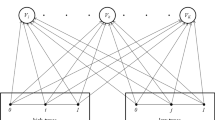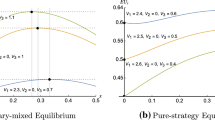Abstract
This paper investigates the optimal (effort-maximizing) structure of multi-stage sequential-elimination contests. We allow the contest organizer to design the contest structure using two instruments: contest sequence (the number of stages, and the number of contestants remaining after each stage), and prize allocation. When the contest technology is sufficiently noisy, we find that multi-stage contests elicit more effort than single-stage contests. For concave and moderately convex impact functions, the contest organizer should allocate the entire prize purse to a single final prize, regardless of the contest sequence. Additional stages always increase total effort. Therefore, the optimal contest eliminates one contestant at each stage until the finale when a single winner obtains the entire prize purse. Our results thus rationalize various forms of multi-stage contests that are conducted in the real world.
Similar content being viewed by others
References
Amegashie J.A.: The design of rent-seeking competitions: committees preliminary and final contest. Public Choice 99, 63–76 (1999)
Amegashie J.A.: Some results on rent-seeking contests with shortlisting. Public Choice 105, 245–253 (2000)
Barut Y., Kovenock D.: The symmetric multiple prize all-pay auction with complete information. Eur J Political Econ 14, 627–644 (1998)
Baye M.R., Kovenock D., de Vries C.G.: Rigging the lobbying process: an application of all-pay auction. Am Econ Rev 86, 289–293 (1993)
Baye M.R., Kovenock D., de Vries C.G.: The solution to the Tullock rent-seeking game when R > 2: mixed-strategy equilibria and mean dissipation rates. Public Choice 81, 362–380 (1994)
Baye M.R., Kovenock D., de Vries C.G.: The incidence of overdissipation in rent-seeking contests. Public Choice 99(3–4), 439–454 (1999)
Clark D.J., Riis C.: A multiple-winner nested rent-seeking contest. Public Choice 87, 177–184 (1996)
Clark D.J., Riis C.: Influence and the discretionary allocation of several prizes. Eur J Political Econ 14, 605–625 (1998)
Clark D.J., Riis C.: Competition over more than one prize. Am Econ Rev 88, 276–289 (1998)
Fu, Q., Lu, J.: The beauty of “Bigness”: on optimal design of multi-winner contests. Games Econ Behav (2008a, forthcoming)
Fu, Q., Lu, J.: A Micro Foundation of Generalized Multi-Prize Contests: A Noisy Ranking Perspective, working paper (2008b)
Fullerton R.L., McAfee P.R.: Auctioning entry into tournaments. J Political Econ 107, 573–605 (1999)
Gradstein M., Konrad K.A.: Orchestrating rent seeking contests. Econ J 109, 535–545 (1999)
Harbaugh R., Klumpp T.: Early round upsets and championship blowouts. Econ Inq 43, 316–329 (2005)
Konrad, K.: Strategy in contests-an introduction. WZB Discussion Papers (2007)
Konrad, K.A., Kovenock, D.: Multi-Battle Contests (April 2006). CEPR Discussion Paper No. 5645. Available at SSRN: http://ssrn.com/abstract=918292
Krishna, V., Morgan, J.: The winner-take-all principles in small tournaments. In: Baye, M. (ed.) Advances in Applied Microeconomics. Stamford: JAI Press (1998)
Matros, A.: Elimination Tournaments where Players Have Fixed Resources, working paper, University of Pittsburgh (2005)
Moldovanu B., Sela A.: The optimal allocation of prizes in contests. Am Econ Rev 91, 542–558 (2001)
Moldovanu B., Sela A.: Contest architecture. J Econ Theory 126, 70–96 (2006)
Moldovanu B., Sela A., Shi X.: Contests for status. J Political Econ 115(2), 338–363 (2007)
Rosen S.: Prizes and incentives in elimination tournaments. Am Econ Rev 76, 701–715 (1986)
Skaperdas S.: Contest success functions. Econ Theory 7, 283–290 (1996)
Yates A.J., Heckelman J.C.: Rent-setting in multiple winner rent-seeking contests. Eur J Political Econ 17, 835–852 (2001)
Author information
Authors and Affiliations
Corresponding author
Additional information
We owe special thanks to Kyung Hwan Baik for the very inspiring discussion. The paper has tremendously benefited from the constructive comments and suggestions provided by an anonymous referee and coeditor Dan Kovenock. We are grateful to Atsu Amegashie, Michael Baye, Indranil Chakaraborty, Jimmy Chan, Jiahua Che, Yeon-Koo Che, John Conlon, Sudipto Dasgupta, Jeff Ely, Hanming Fang, Yuk-Fai Fong, Qiang Gong, Tanjim Hossain, Xinyu Hua, Kai Konrad, Tilman Klumpp, Lawrance Martin, Johannes Münster, Benny Moldovanu, Marco Ottaviani, Ivan Png, Aner Sela, Curtis Taylor, Lixin Ye, Hussein Yildrim, Hongjun Zhong and Wen Zhou. We would like to acknowledge the helpful comments and suggestions made by participants of 2006 Midwest Economic Theory Meeting, the 2006 PET conference, the 2007 SET conference, the 2008 Young Research Workshop on Contests (WZB, Berlin), the 2008 CESifo Venice Workshop on Contests, and the 2008 HKUST IO Workshop. The authors gratefully acknowledge the financial support from National University of Singapore [R-313-000-068-112 (Q. Fu) and R-122-000-108-112 (J. Lu)].
Rights and permissions
About this article
Cite this article
Fu, Q., Lu, J. The optimal multi-stage contest. Econ Theory 51, 351–382 (2012). https://doi.org/10.1007/s00199-009-0463-z
Received:
Accepted:
Published:
Issue Date:
DOI: https://doi.org/10.1007/s00199-009-0463-z




